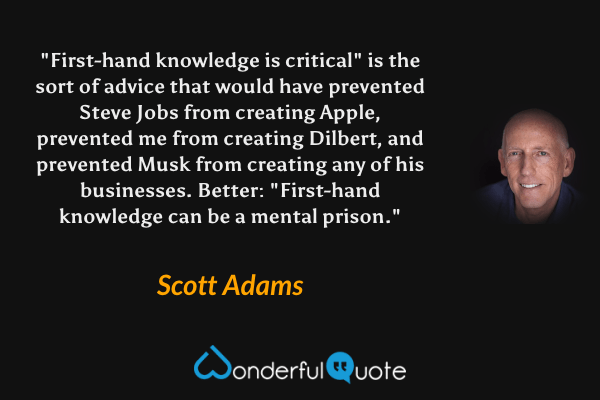Startup Quotes
Most popular startup quotes
Ideas without implementation, or without an exceptional team to implement them, are like assholes and opinions: everyone's got one.
When confronted with any startup idea, ask yourself one simple question: How many miracles have to happen for this to succeed?
The classic sign of a shitty startup idea is that it requires at least two (or more!) miracles to succeed.
First [of two traits that distinguish successful startup founders], the ability to monomaniacally and obsessively focus on one thing and one thing only, at the expense of everything else in life.

Pick business partners with high intelligence, energy, and, above all, integrity.

An early exit for your startup is a mirage in the desert. If you thirst for it, it disappears.

The lesson of history is that true product / market fits are very precise (so, iterate!)

"First-hand knowledge is critical" is the sort of advice that would have prevented Steve Jobs from creating Apple, prevented me from creating Dilbert, and prevented Musk from creating any of his businesses. Better: "First-hand knowledge can be a mental prison."
Don't worry about people stealing your ideas. If your ideas are any good, you'll have to ram them down people's throats.
The problem with the Internet startup craze isn't that too many people are starting companies; it's that too many people aren't sticking with it. That's somewhat understandable, because there are many moments that are filled with despair and agony, when you have to fire people and cancel things and deal with very difficult situations. That's when you find out who you are and what your values are.

There are two traits fundamental to an effective product-focused business. The first is reach (i.e., the ability to influence a large audience). The second is scalability (i.e., an aptitude for growing revenue far more quickly than costs).

Recruit technical leadership with a teaching orientation. The best way to ensure that your CTO is going to make you a better CEO is to hire a CTO who likes to teach. Make it clear that you're looking for someone to drive change and educate you and the team. Beware CTOs who try to "shield" you from the details. Being able to explain complex things simply is a job requirement.

Start with a product that's informed by your consulting. The services you provide expose you to real-life problems that consumers and organizations face.

That's one of the biggest things I've learned about startups: it's dangerous to go alone. You want people around you who've been through this before and are willing to openly share their experiences.

Pro Tip: If you have any type of subscription or recurring revenue, make sure you measure LTV (Lifetime Value— the total revenue customers spend during their relationship with your firm) by referral source(s) and by the number of visits prior to conversion.

Raising prices for your product every year or two and grandfathering in existing customers is a great way to increase loyalty and grow your profit margins. (We did this several times over the next few years; it worked like a charm.)

If you can reset your passion from "I want to do *this* work" to "I want to see something I create change the world in *this* way," your expectations will align with reality, and the cognitive dissonance and frustration of being torn away from the work you love can fade.

Unless what you love is managing people, handling crises, delegating, holding people responsible, recruiting, setting, then constantly amplifying and repeating the company's mission, vision, strategy, and values, being a startup CEO may not provide you with the work you love to do.


